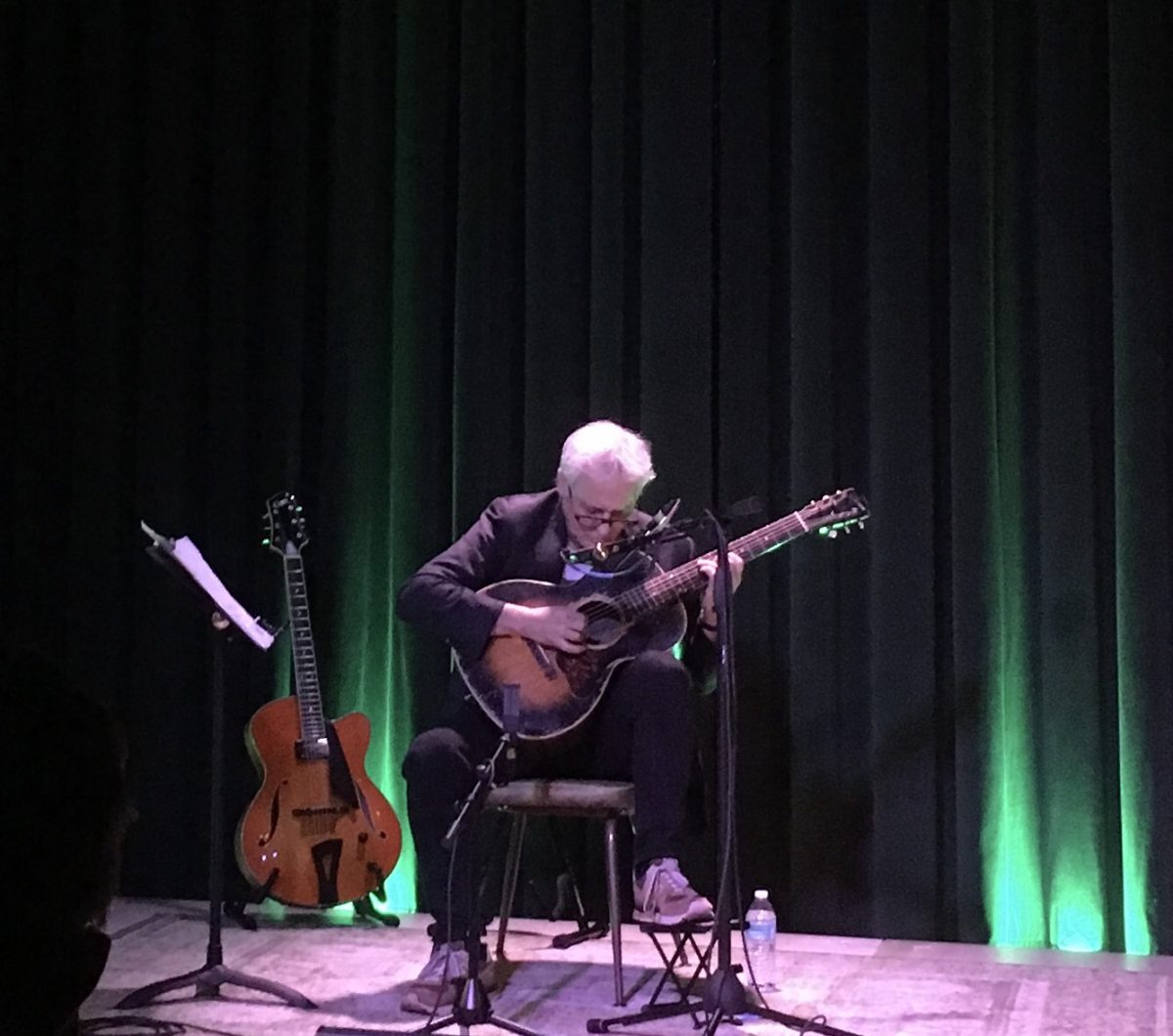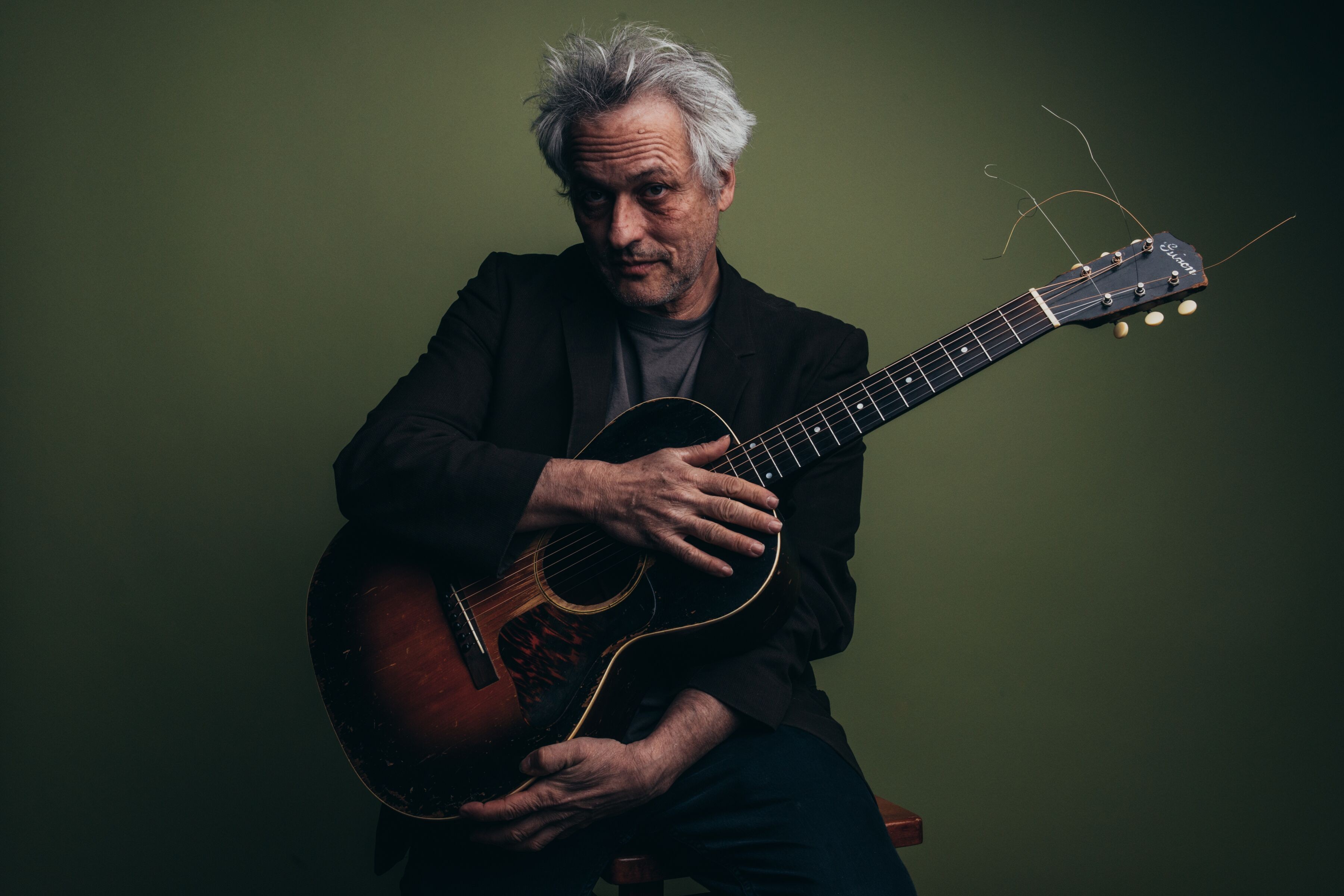“Whew!” was the general response in the crowd as guitarist Marc Ribot sounded his last note of the night and disappeared backstage. Eyes wide with amazement, the audience seemed to be emerging from a roller coaster ride, and indeed they had, after a fashion. Ribot had just taken us on a mystery tour of his weathered Gibson acoustic (possibly a pre-War model) and every musical method he could muster to coax sound from it.
Most know the guitarist for his work as a session and side man with the likes of Tom Waits, Caetano Veloso, John Zorn, Jack McDuff, Wilson Pickett, The Lounge Lizards, Arto Lindsay, T-Bone Burnett, Medeski, Martin and Wood, Cibo Matto, Elvis Costello, Robert Plant & Alison Krauss, Susana Baca, The Black Keys, Elton John, Madeleine Peyroux, Marianne Faithfull, Diana Krall, Allen Toussaint, and Robert Quine. But he’s led his own groups for over 30 years as well.
The music he played last Saturday in The Green Room was closest in spirit to the free jazz he typically creates with his group Ceramic Dog. But while that trio certainly casts a wide, anarchic net, the variety of music evoked at his most recent Memphis performance was even more inclusive. It ran like a dream one must have to fully process a day of travel, skipping from scene to scene, and in that sense, encompassed some very lyrical and folk passages that were downright traditional. Yet no style or melody was allowed to linger for long, as Ribot’s restless creativity soon replaced it with another musing.
From the start, the musical quotes seemed to fit Memphis, and perhaps the show really was Ribot’s way of processing his visit here. Opening with a quiet folk melody and chords reminiscent of “Shenandoah,” he quickly moved to more dissonant territory, while somehow still incorporating quotes from “Santa Claus is Coming to Town.”
One might consider him a master of the guitar, both acoustic and electric, but he speaks more of his limitations than his talents. As he told Guitar Player magazine in 1997, he’s been handicapped to a degree by having learned to play with his right hand, despite being left handed. “That’s a real limit, one that caused me a lot of grief when I was working with Jack McDuff and realizing I wasn’t following in George Benson’s footsteps. I couldn’t be a straight-ahead jazz contender if you held a gun to my head.”
Yet that same limitation has somehow caused Ribot to approach the guitar almost like a pianist. Multiple melodies wove around each other, as he sounded the low, middle, and high strings nearly independently, creating stunning counterpoint and chordal accompaniments.
At times, you’d hear echoes of other projects he’s led. After one far-ranging flurry of improvisation, he noted that parts of it referenced Marc Ribot Plays Solo Guitar Works of Frantz Casseus, a 1993 album of solo guitar works written by the Haitian-American composer. Other portions evoked his work with Los Cubanos Postizos, comprised of Cuban music, or other eclectic world music sources, including echoes of Bahamian folk singer Joseph Spence.
Other portions were more closely related to John Cage’s music for cacti or other such “outside of the box” works, as when he simply drummed on the guitar body or frailed the fret board with rhythmic abandon. The audience remained galvanized, The Green Room being a perfect venue for those who show up to listen deeply.
Memphis seemed to creep into the journey more directly as well, including bluesy quotes (a snatch of “Blue Monk”?) that would have felt at home on Beale Street, or passages that alluded to standards like “Come Rain or Come Shine.” But Memphis also cropped up in the few sparse comments he made between performances. “Thank you,” he said. “I’m very glad to be back in Memphis. This very room was the last gig I did before the shutdown almost two years ago. So I’m glad to be here. In fact, I’m glad to be anywhere.” Judging from the roaring applause that brought him out for an encore, Memphis music fans were glad as well.

